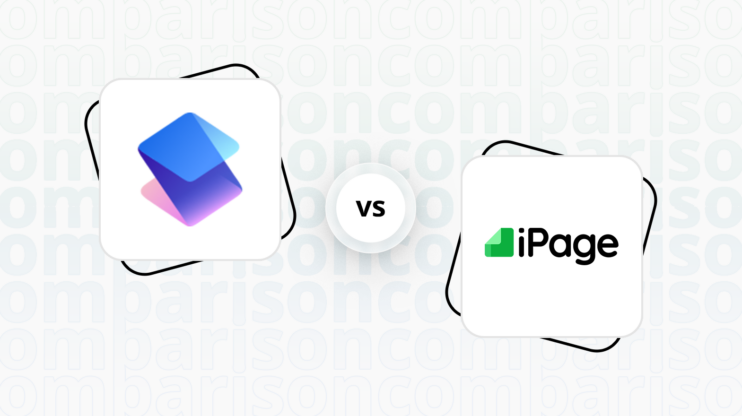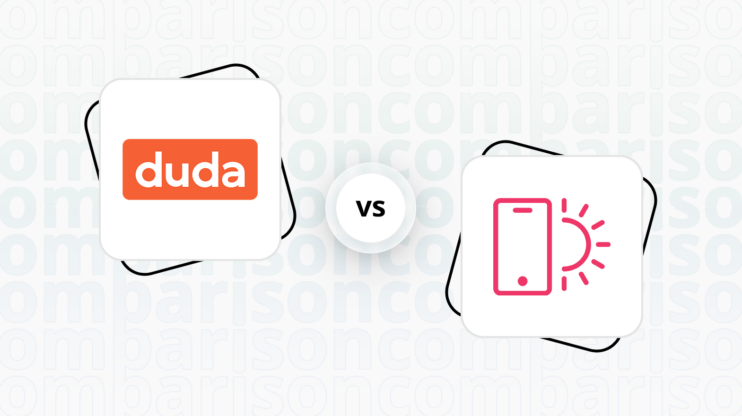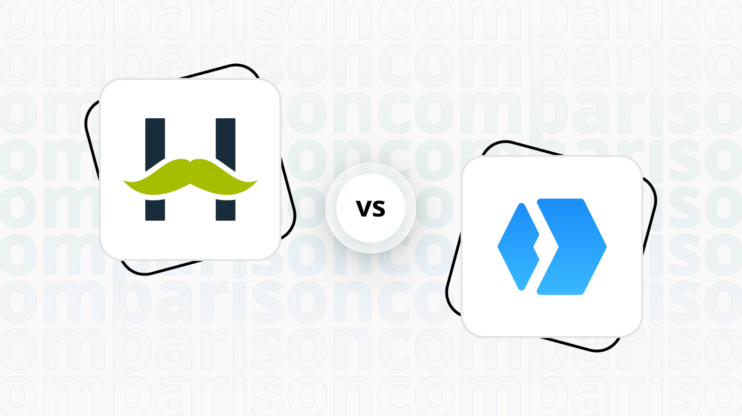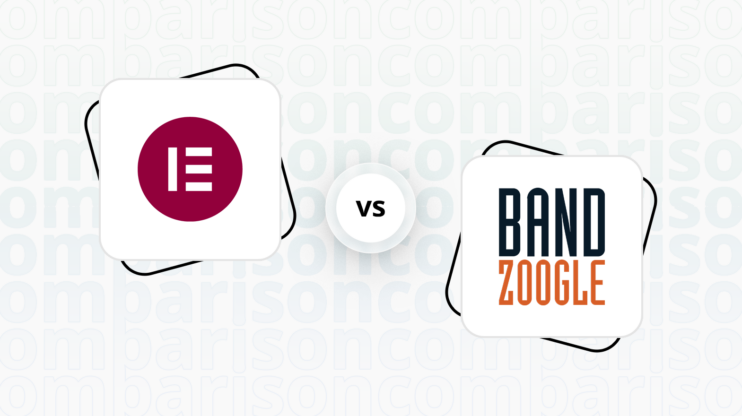Final verdict
Elementor and Duda both offer robust website building solutions, but they cater to different needs and preferences.
-
Elementor (Overall Grade: 7.4/10)
is a powerful WordPress plugin known for its flexibility and extensive customization options. It excels in design functionalities, ease of use, and AI capabilities, making it ideal for users who want complete control over their website’s appearance and functionality. When comparing Elementor vs Duda, Elementor stands out for its integration with WooCommerce for ecommerce, making it a strong choice for WordPress users looking to build an online store. -
Duda (Overall Grade: 7.8/10)
offers a comprehensive website building and hosting platform with a focus on ease of use and professional design. It provides a range of customizable templates, built-in ecommerce features, and strong hosting quality. In the Elementor vs Duda comparison, Duda is particularly well-suited for agencies and designers who need to manage multiple client websites, thanks to its white label option and collaborative tools.

|

|
|
|---|---|---|
|
Design functionalities & templates |
9.2 |
8.3 |
|
Ease of use |
8.8 |
8.4 |
|
Ecommerce |
7.6 |
7.4 |
|
Website Editors |
8.5 |
8.3 |
|
Product testing options |
5.6 |
8.4 |
|
Price |
8.0 |
7.9 |
|
Hosting quality |
7.8 |
8.8 |
|
Website speed optimization |
6.7 |
7.6 |
|
Plugins/extensions and integrations |
7.6 |
7.7 |
|
Marketing features |
7.8 |
7.1 |
|
Customer support |
7.2 |
7.5 |
|
Website security |
9.1 |
8.6 |
|
AI capabilities |
7.4 |
7.3 |
|
User Management |
8.8 |
8.0 |
Best for ecommerce
 7.6
7.6
 7.4
7.4
Verdict
: Elementor and Duda both offer solid ecommerce capabilities, but Elementor’s integration with WooCommerce gives it a slight edge for more advanced ecommerce needs.
-
Elementor
: Leveraging WooCommerce, Elementor provides a robust ecommerce solution with extensive customization options. It offers a wide range of ecommerce widgets and templates, making it suitable for both beginners and professional web designers. When comparing Elementor vs Duda, Elementor stands out for its flexibility and detailed customization capabilities. -
Duda
: Duda includes built-in ecommerce features that are easy to use and manage, making it a good choice for those who prefer an all-in-one solution. It offers essential ecommerce functionalities and a variety of templates, but it may not match Elementor’s depth in customization and flexibility.
Best for informational & business websites
 8.9
8.9
 8.4
8.4
Verdict
: Elementor slightly edges out Duda for informational and business websites, thanks to its higher customization flexibility and comprehensive design functionalities. However, Duda remains a strong contender with its robust hosting and integrated tools.
-
Elementor
: Elementor scores 8.9 for informational and business websites. It is a powerful website builder plugin for WordPress, known for its flexibility and extensive range of templates and widgets. Elementor’s drag-and-drop interface and responsive design options make it suitable for both beginners and professional web designers. Its integration with various WordPress themes and plugins enhances its functionality, making it a versatile choice for creating detailed and customized informational websites. -
Duda
: Duda scores 8.4 for informational and business websites. It is a user-friendly website builder and hosting platform that offers a range of customizable templates and features. Duda is particularly strong in hosting quality and website speed optimization, making it a reliable choice for professional and responsive websites. Its white label option is beneficial for agencies and designers managing multiple client websites. While it may not offer the same level of design flexibility as Elementor, Duda’s comprehensive toolkit and integrated approach make it a solid option for business websites.
Detailed comparison
Design functionalities & templates
Design FunctionalitiesRepresents how well each platform allows for creative design and customization of websites.Score Components:
- Template Variety (30%): Range and quality of design templates.
- Customization (30%): Flexibility and options for design alterations.
- User Interface (20%): Ease and intuitiveness of the design process.
- Responsiveness (10%): Adaptability to different devices and screen sizes.
- Innovation (10%): Unique design features and tools.
 9.2
9.2
 8.3
8.3
🏆
Winner: Elementor.
If you’re looking for a platform that offers more creative control, a wider range of templates and designs, and a higher level of customization flexibility, Elementor is the preferred choice.
Elementor offers an extensive range of templates and designs, with over 100 responsive website kits covering various categories like business, creative, education, and more, directly available through Elementor’s platform. Additional sources like Envato Elements, Template Monster, and others provide a wider selection, including free and premium options, catering to diverse web design needs.
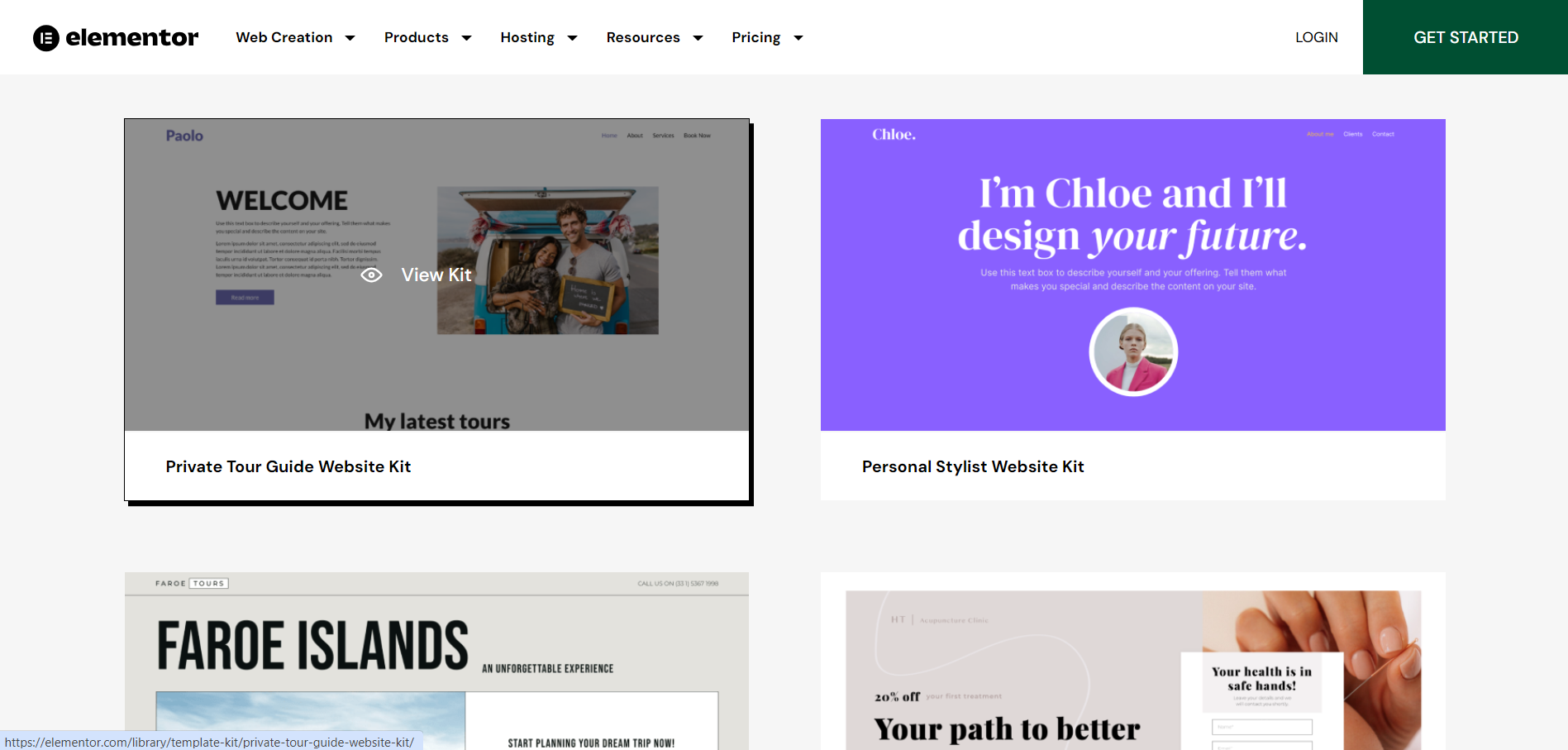
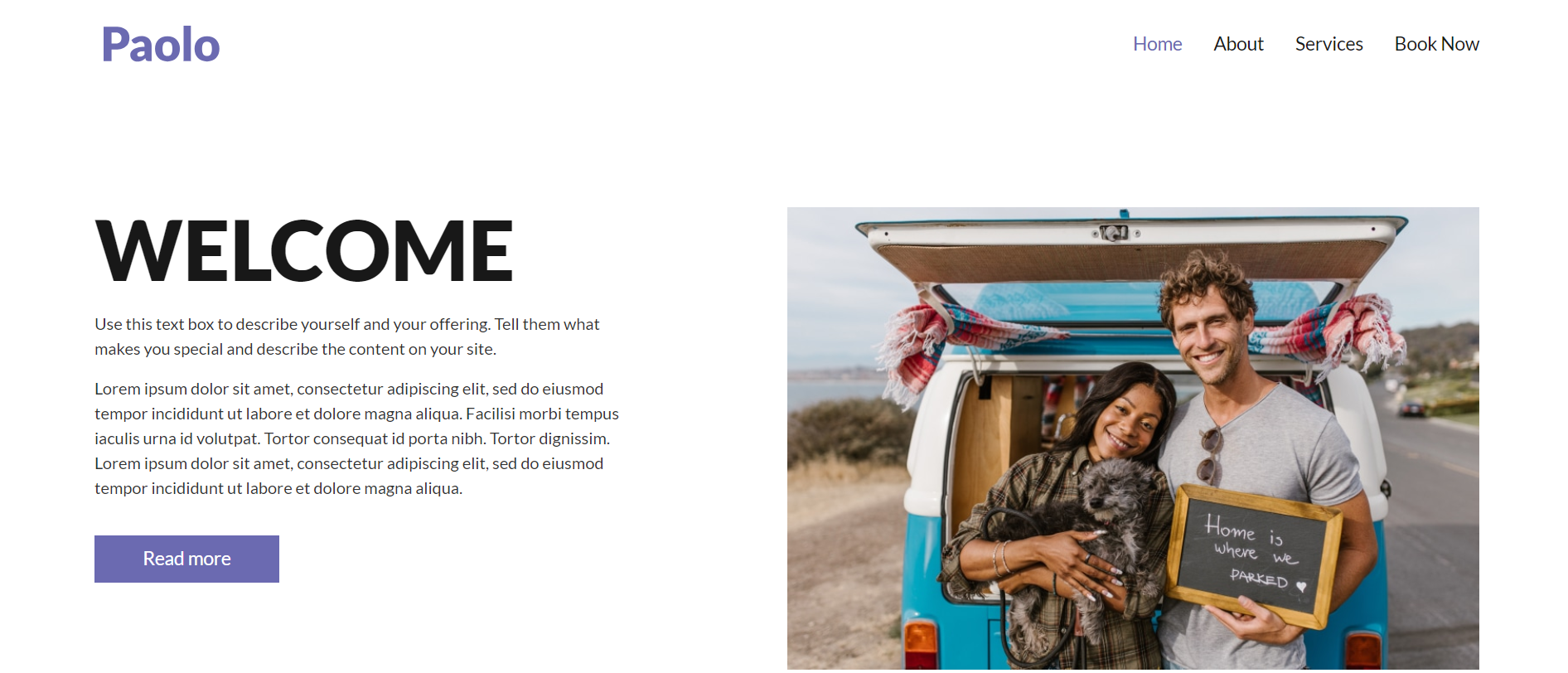
Compared to Elementor, Duda offers a wide variety of templates and designs for its website builder. With over 180 templates to choose from, users have the flexibility to create a website that suits their unique needs and style. The templates are professionally designed and cover various industries, ensuring that businesses of all types can find a suitable option.


Get a head start on website creation with AI
Create a custom website tailored to your business needs 10X faster with 10Web AI Website Builder!
Ease of use
Ease of useReflects the platform’s overall user-friendliness.Score
Components:
- Learning curve (40%): Quickness and ease of getting started.
- Interface design (30%): Simplicity and intuitiveness of layout.
- User guidance (20%): Quality of tutorials and support.
- Flexibility (10%): Adaptability to various user skills.
 8.8
8.8
 8.4
8.4
🏆 Winner: Elementor
. With a score of 8.8, Elementor edges out Duda (8.4) in terms of ease of use. Elementor’s user-friendly interface, drag-and-drop functionality, and wide range of pre-designed templates and widgets make it a flexible and intuitive platform for building websites. Duda, while also praised for its intuitive user interface and customizable templates, may not be as cost-effective for individuals or smaller businesses.
Learning Resources
🏆 Winner: Tie
. Both Elementor and Duda offer extensive, high-quality learning resources. Elementor provides a wide array of resources through its Elementor Academy, covering topics from basic usage to advanced design and business growth strategies. Duda, on the other hand, offers comprehensive documentation, video tutorials, and an active community forum, along with direct support services and structured online courses and certifications.
For ecommerce
EcommerceMeasures the platform’s effectiveness in supporting online business activities.Score Components:
- Ecommerce themes and templates (20%): Variety and design of templates.
- Product management (25%): Ease of managing and organizing products.
- Payment options (25%): Variety and convenience of payment methods.
- Ecommerce features (20%): Features for managing an ecommerce store.
- Integration (10%): Compatibility with external e-commerce tools and services.
 7.6
7.6
 7.4
7.4
Elementor and Duda both offer ecommerce capabilities, but they approach it in different ways. Elementor leverages its integration with WooCommerce to provide a robust ecommerce solution, while Duda includes built-in ecommerce features.

|

|
|
|---|---|---|
|
Ecommerce themes and templates |
7.8 |
6.5 |
|
Product page customization |
8.4 |
7.5 |
|
Payment processing and commissions |
7.5 |
7.0 |
|
POS capabilities |
5.5 |
5.5 |
|
Payment gateways |
7.0 |
7.5 |
|
Product numbers |
7.0 |
7.0 |
|
Additional ecommerce features |
8.0 |
7.0 |
Elementor ecommerce features:
- WooCommerce Integration
- Customizable Product Pages
- Ecommerce Widgets
- Product Categories and Filters
- Shopping Cart Customization
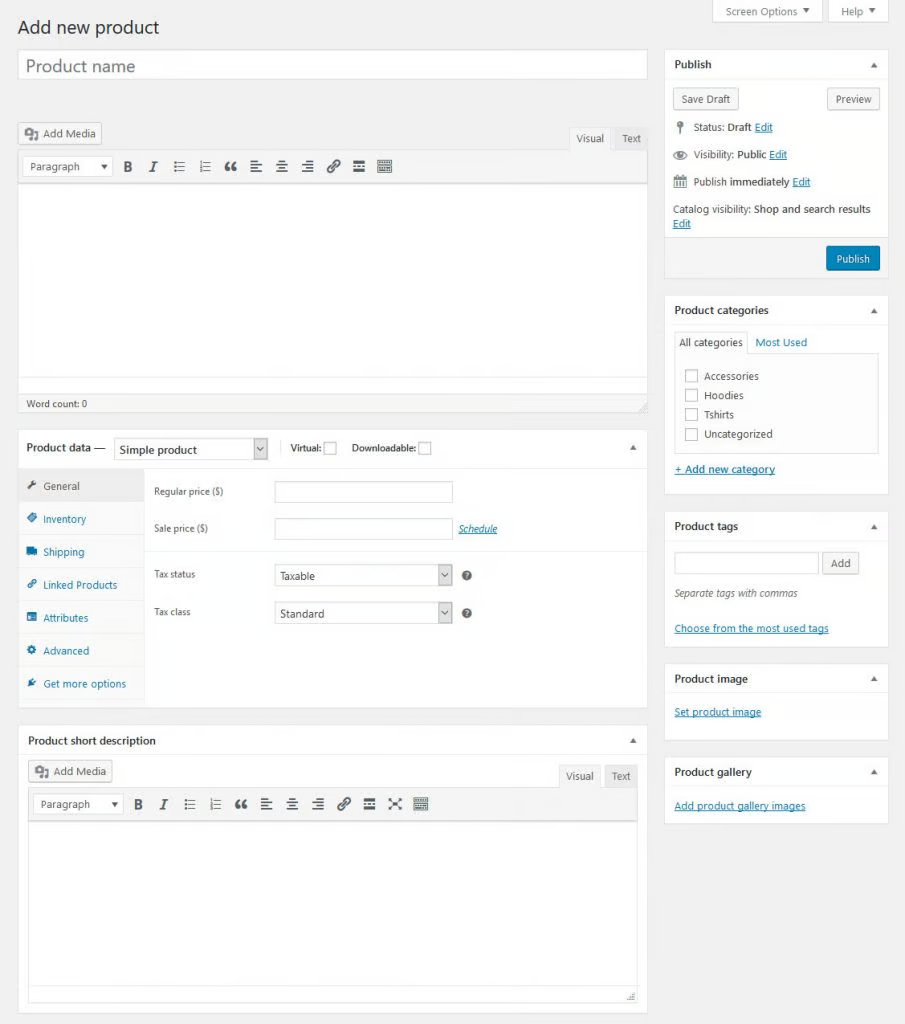
Duda ecommerce features:
- Product and Inventory management
- Payment processing
- Shopping and Tax settings
- Coupons and discounts
- SEO and Marketing tools
- Analytics and reporting
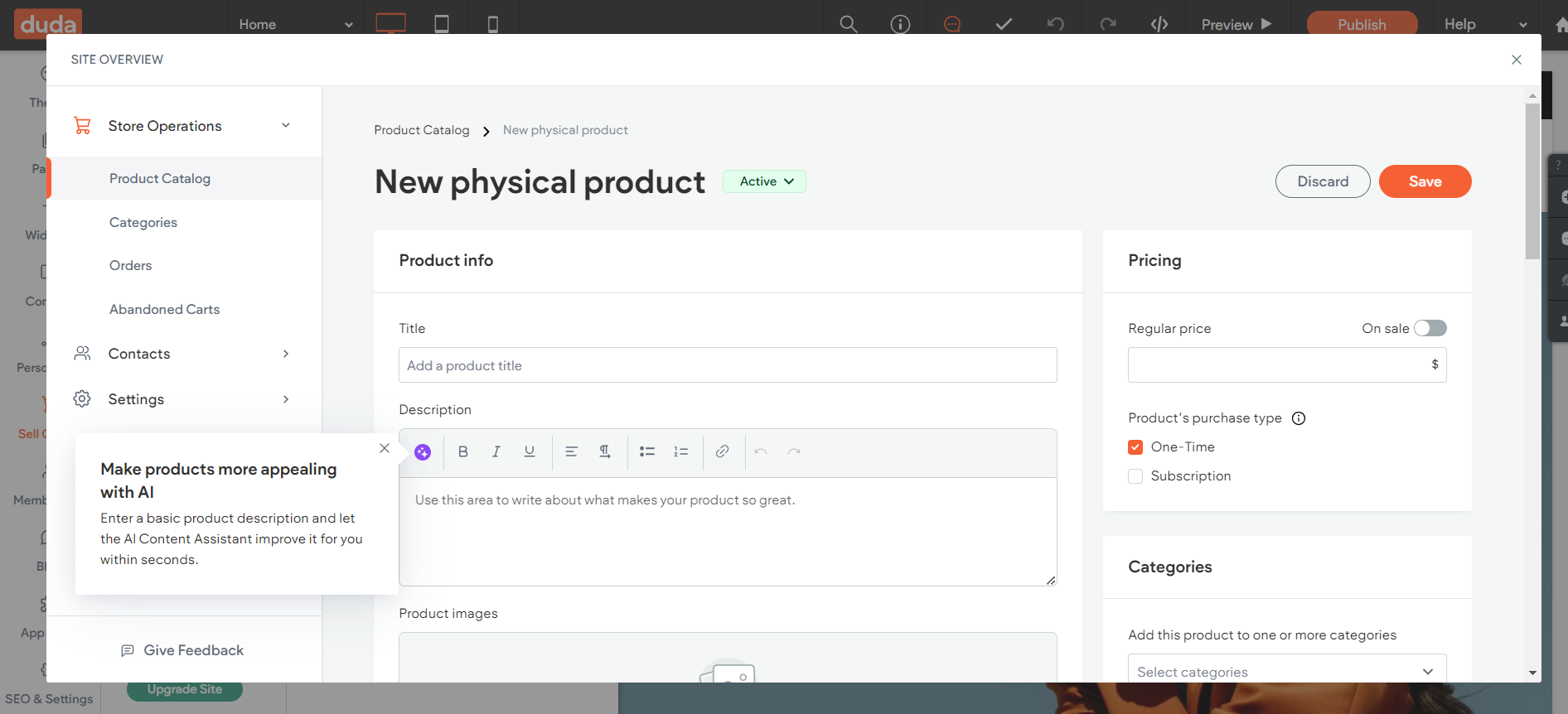
Ecommerce themes & templates
Elementor offers a diverse range of ecommerce-specific templates suitable for various online stores. These templates are designed to be mobile-responsive and SEO-friendly, ensuring optimal performance across devices and search engines. On the other hand, Duda offers a small variety of ecommerce templates designed to help businesses create professional, responsive online stores. These templates are specifically tailored to support a wide range of ecommerce functionalities.
Product page customization
Elementor offers extensive customization options for WooCommerce product pages, including custom layouts, WooCommerce widgets for various product elements, and options for styling product galleries and ‘Add to Cart’ buttons. Duda, on the other hand, allows for easy addition of variations such as size and color directly from the product management section. It also offers bulk import/export functionality through CSV files, streamlining the process for managing large inventories.
Payment processing
Elementor supports several payment gateways, notably through plugins and integrations, with Stripe and PayPal being prominent options for simple and widespread use. Duda’s website builder integrates with Stripe and PayPal for payment processing, offering various methods like credit cards and AliPay. While primarily an online store builder, it indirectly supports POS capabilities through these gateways. Duda also allows integration with third-party payment providers for flexibility and supports client billing using Stripe. Overall, it offers comprehensive ecommerce features, including over 30 payment provider integrations.
Website Editors
Website EditorsEvaluates the platforms’ website building and editing capabilities.Score Components:
- Customization tools (40%): Range and power of editing features.
- Editor usability (30%): User experience within the editor.
- Design flexibility (20%): Freedom in layout and design changes.
- Update and maintenance ease (10%): Simplicity of updating and maintaining the site.
 8.5
8.5
 8.3
8.3
🏆
Winner: Elementor
. Elementor, with a score of 8.5, offers a drag-and-drop interface that makes it easy to customize layouts, add content, and style websites visually in real-time. With a wide array of widgets and templates, users can effortlessly design complex elements such as sliders, forms, and animated headlines. Additionally, Elementor provides responsive design options, ensuring websites look great on all devices, alongside advanced features like custom CSS, role-based access control, and integration with a variety of marketing tools.
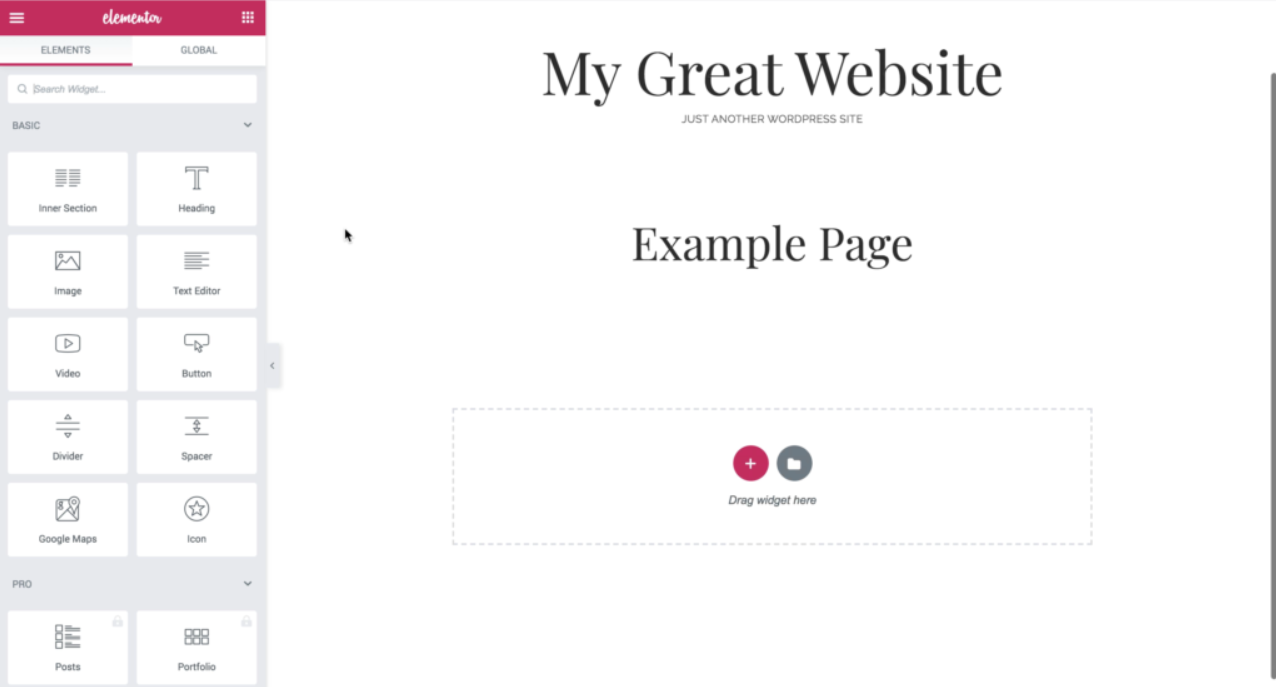
Duda’s editor, scoring 8.3, is a user-friendly platform designed for creating responsive websites with ease, targeting professionals, agencies, and business owners. It features a drag-and-drop interface, a wide range of customizable templates, and integrated SEO and marketing tools. The platform also offers ecommerce capabilities, collaborative tools for client management, and ensures websites are optimized for all devices. Hosting and security are taken care of by Duda, providing a comprehensive solution for building and managing professional websites efficiently.
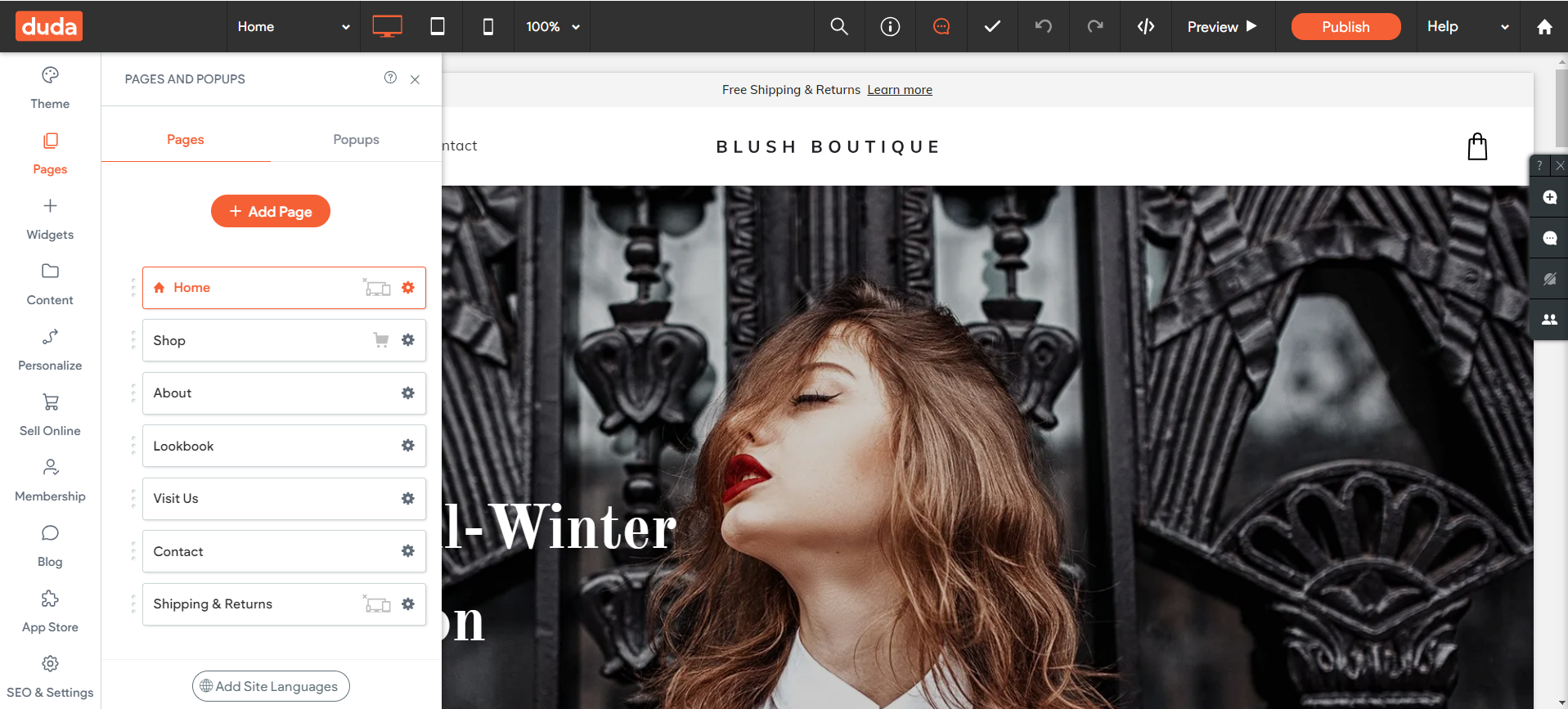
Mobile editor/app
 0
0
 5.5
5.5

🏆
Winner: Duda
. Both Elementor and Duda do not offer a dedicated mobile editor app. However, Duda supports mobile editing through its platform, allowing users to perform limited editing and republish sites directly from mobile devices. On the other hand, Elementor does not have any mobile editing capabilities. Therefore, Duda is the winner in this category.
Product testing options
Product Testing OptionsAssesses the options for trying out platform features before commitment.Score Components:
- Trial quality (40%): Extent and usefulness of the trial or free version.
- Feature accessibility (30%): How many features are available to test.
- Trial duration (20%): Length of the trial period.
- Ease of transition (10%): Smoothness of moving from trial to paid plans.
 5.6
5.6
 8.4
8.4
Overall Result
:
Duda Wins
. Duda scores 8.4 in product testing options, outperforming Elementor which scores 5.6. Duda offers a 14-day free trial with access to all features of each plan, providing a comprehensive testing experience. Elementor, on the other hand, does not offer a trial version, but it does provide a free version for self-hosted WordPress.org users and allows testing of all premium features during the refundable period.

|

|
|
|---|---|---|
|
Free Plan |
Yes, but only for self-hosted WordPress.org |
No |
|
Trial Duration |
No |
14 days |
|
Testing Premium Features |
It is possible to test all the premium features during the refundable period. |
All features of each plan during free trial |
|
Money Back Guarantee |
30-day money back guarantee | 30 day money back guarantee |
Price
PriceLooks at the cost-effectiveness and value for money of each platform.Score Components:
- Plan value (40%): What each pricing tier offers.
- Transparency and clarity (30%): Clearness of pricing structures.
- Flexibility of plans (20%): Range of options to suit different budgets.
- Hidden costs (10%): Additional expenses not included in the plan.
 8.0
8.0
 7.9
7.9
Elementor and Duda have similar pricing scores, with Elementor slightly ahead. While Elementor does not offer enterprise-level support, Duda provides a custom plan for larger businesses or organizations requiring advanced features and support.

|

|
|
|---|---|---|
|
$0-$10 |
Basic ($9.99/month): 1 website, with 10GB SSD storage, 25k monthly visitors, 30GB monthly bandwidth, daily auto backups stored for 14 days, Cloudflare CDN, and integrated caching tool. Value for price: 6.5 |
No offering at this amount. |
|
$10-$20 |
Business ($19.99/month): 1 website, with 20GB SSD storage, 50k monthly visitors, 50GB monthly bandwidth, daily auto backups stored for 30 days, Cloudflare CDN, integrated caching tool and access to staging environment. Value for price: 7.5 |
No offering at this amount. |
|
$20-$30 |
Grow ($22.99/month): 3 websites, with 30GB SSD storage, 75k monthly visitors, 75GB monthly bandwidth, daily auto backups stored for 30 days, Cloudflare CDN, integrated caching tool, access to staging environment and site cloning. Value for price: 8.5 |
Basic ($25/month): Includes hosting for one website with email support, 99.99% uptime, and access to Duda’s AI Content Assistant. Value for price: 6.0 |
|
$30-$50 |
Scale ($49.99/month): 10 websites, with 40GB SSD storage, 100k monthly visitors, 100GB monthly bandwidth, daily auto backups stored for 30 days, Cloudflare CDN, integrated caching tool, access to staging environment and site cloning. Value for price: 9.0 |
Team ($39/month): Adds up to three team members, priority email, chat, and phone support, with team and client management features. Value for price: 7.0 |
|
$60-$70 |
No offering at this amount. |
Agency ($69/month): Offers hosting for up to four websites with priority support, account management, and access to advanced features. Value for price: 8.0 |
|
$100+ |
No offering at this amount. |
White Label ($199/month): For those needing to offer Duda under their own branding, including all Agency features plus white-label client access. Value for Price: 9.0 |
location. As a result in rare cases the prices displayed here can differ from the ones you see on their
websites.
Hosting quality
Hosting
qualityExamines the reliability and performance of the hosting solutions.Score Components:
- Uptime (40%): Consistency and reliability of website availability.
- Speed (30%): Loading times and performance.
- Bandwidth and storage (20%): Sufficiency of resources provided.
- Data centers (10%): Quality and distribution of hosting infrastructure.
 7.8
7.8
 8.8
8.8
Winner: Duda
. Duda’s hosting services, powered by Amazon Web Services (AWS), offer high speed and unlimited storage or bandwidth. With a 99.99% uptime guarantee, Duda provides a more reliable hosting solution than Elementor, which offers managed WordPress hosting with a 99.9% uptime guarantee. Duda’s hosting services are more robust, earning it a higher rating.

|

|
|
|---|---|---|
|
Do they offer hosting? |
Yes, included in all their plans |
Yes, included in all their plans |
|
Data Centers: |
1 data center in Belgium |
Duda relies on Amazon Web Services (AWS) |
|
Type of hosting: |
Managed WordPress Hosting |
AWS Cloud Hosting |
|
Uptime: |
99.9% |
99.99% |
|
Uptime Guarantee: |
Yes, 99.9% |
Yes, 99.99% |
Website Speed Optimization
Website Speed OptimizationEvaluates optimization of website loading timesScore Components:
- PageSpeed Score (30%): Google’s score indicating performance optimization.
- Loading Time (30%): The average time until a website is fully interactive.
- Mobile Optimization (15%): Optimization effectiveness for mobile devices.
- Resource Optimization (15%): Optimizing images, scripts, and other heavy resources.
- CDN Usage (10%): Use of CDN to enhance speed across geolocations.
 6.7
6.7
 7.6
7.6
🏆 Winner: Duda
Both Elementor and Duda prioritize website performance and page speed, but Duda has a slight edge due to its emphasis on efficient code and file minification, CDN, image optimization, mobile-responsive designs, and AMP support.

|

|
|
|---|---|---|
|
Focus |
Lazy Loading, Code Minification, Caching, CDN |
Efficient Code and File Minification, CDN, Image Optimization, Mobile-Responsive Designs and AMP Support |
|
Performance Tools |
Google Lighthouse, PageSpeed Insights |
Google PageSpeed Insights Integration |
|
Key Strategies |
Lazy Loading, Code Minification, Caching, CDN |
Efficient Code and File Minification, CDN, Image Optimization, Mobile-Responsive Designs and AMP Support |
|
Load Times |
Varies depending on optimization and website complexity |
Varies widely, depending on the optimization and user’s location |
|
Page Speed Scores Range |
Varies depending on optimization and website complexity |
Varies widely, depending on the optimization and user’s location |
|
Core Web Vitals Improvement |
No information disclosed |
Emphasis on LCP, FID, CLS improvements |
Duda’s approach to enhancing site speed includes efficient code and file minification, CDN, image optimization, mobile-responsive designs, and AMP support. Duda also places a strong emphasis on improving Core Web Vitals (CWV) scores, focusing on Largest Contentful Paint (LCP), First Input Delay (FID), and Cumulative Layout Shift (CLS) improvements. However, the load times and PageSpeed scores can vary widely, depending on the optimization and user’s location.
On the other hand, Elementor’s strategies for speed optimization include lazy loading, code minification, caching, and CDN. However, Elementor does not disclose any information about its Core Web Vitals improvements. The load times and PageSpeed scores can vary depending on the optimization and website complexity.
Get a head start on website creation with AI
Create a custom website tailored to your business needs 10X faster with 10Web AI Website Builder!
Plugins and integrations
Plugins and integrationsMeasures the range and effectiveness of additional plugins and integrations.Score Components:
- Variety of options (40%): Range of available add-ons.
- Integration smoothness (30%): Ease of integrating plugins into the site.
- Quality of plugins (20%): Functionality and reliability of the options.
- Custom integration capabilities (10%): Support for custom or third-party integrations.
 7.6
7.6
 7.7
7.7
🏆 Winner: Duda.
Duda edges out Elementor with a score of 7.7, offering built-in widgets, app integrations, and the ability to create custom widgets. Elementor, scoring 7.6, also offers a wide range of add-ons, but Duda’s integrated approach and comprehensive toolkit give it a slight advantage.
It’s worth noting that both platforms offer a mix of free and premium options, allowing users to choose based on their specific needs and budget.
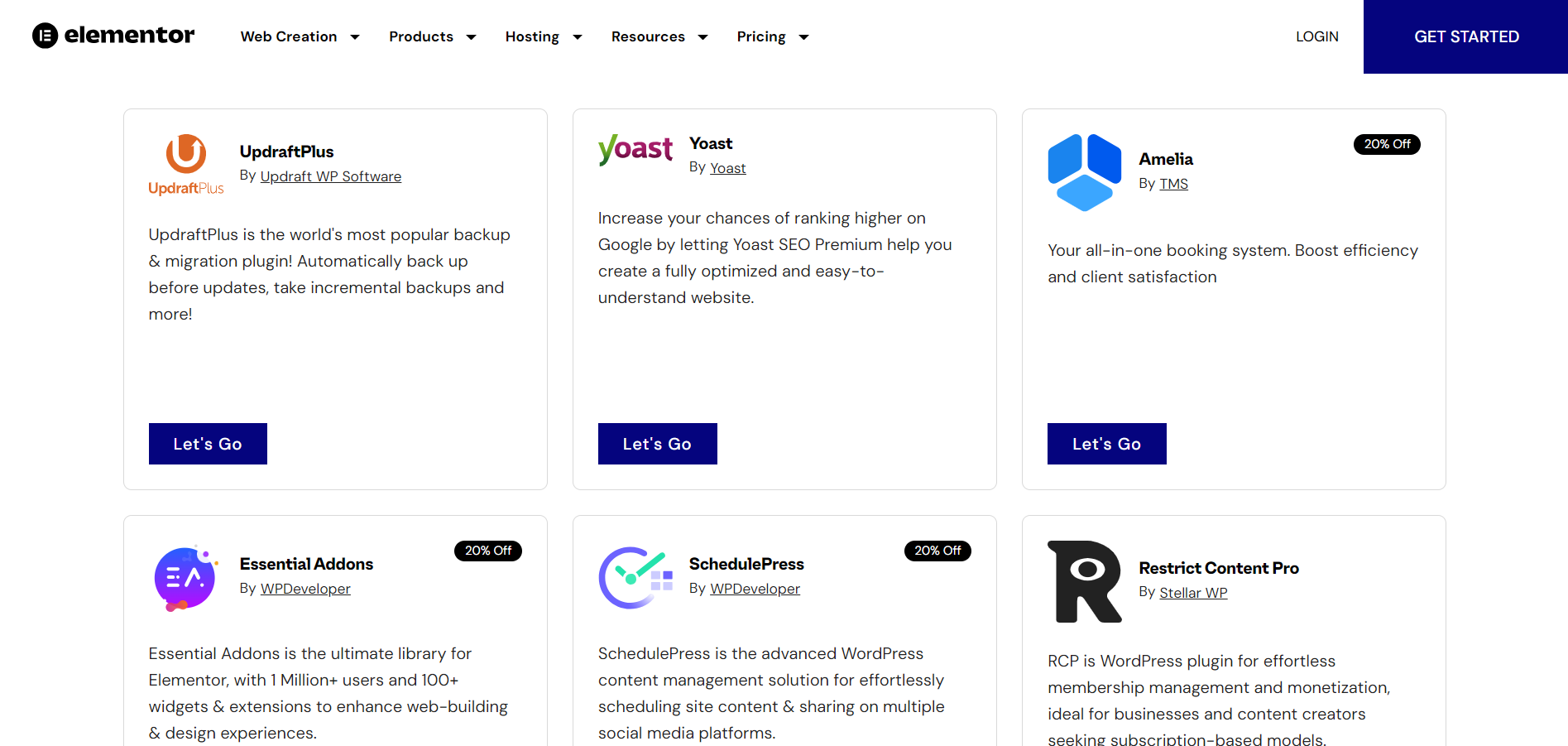
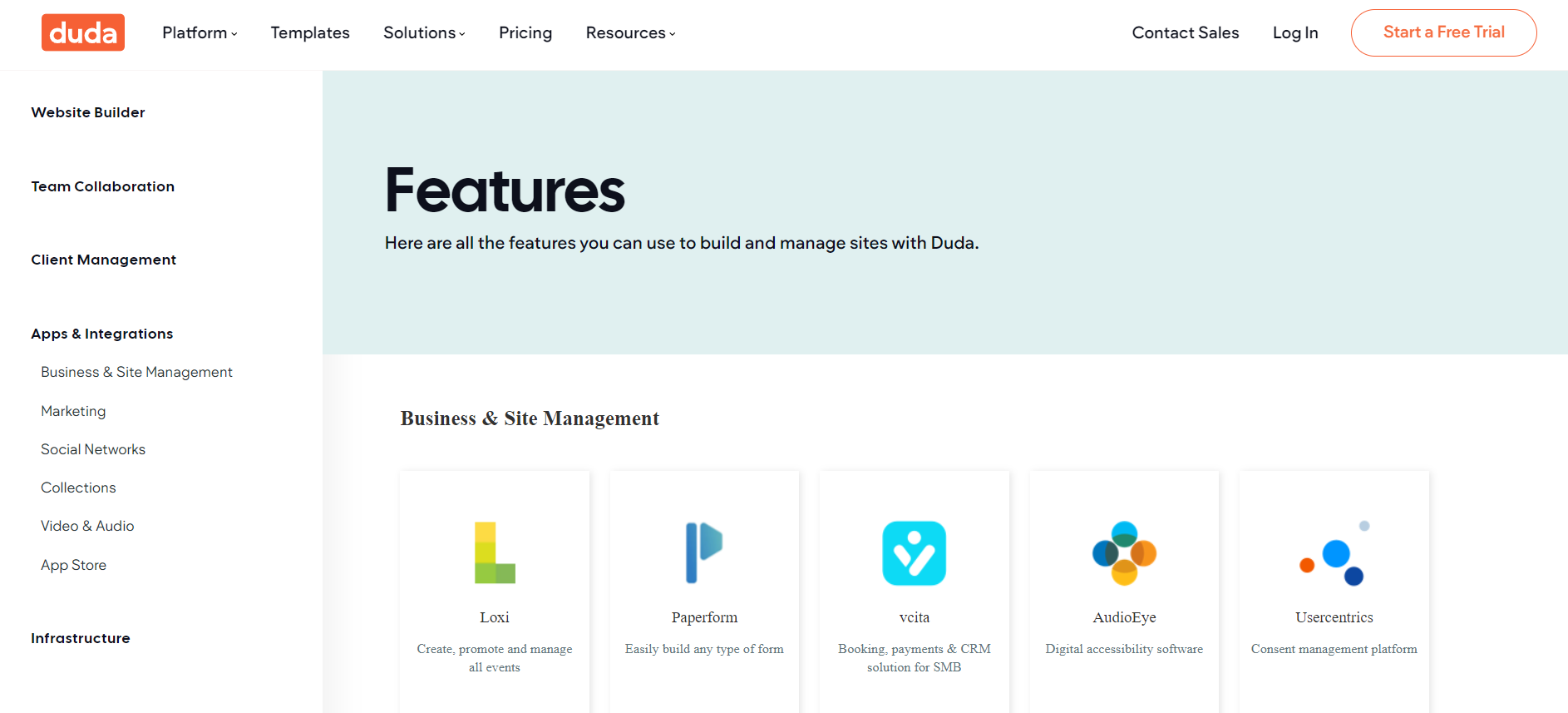
Marketing Features
Design FunctionalitiesRepresents how well each platform allows for creative design and customization of websites.Score Components:
- Template Variety (30%): Range and quality of design templates.
- Customization (30%): Flexibility and options for design alterations.
- User Interface (20%): Ease and intuitiveness of the design process.
- Responsiveness (10%): Adaptability to different devices and screen sizes.
- Innovation (10%): Unique design features and tools.
 7.8
7.8
 7.1
7.1
🏆
Overall Winner: Elementor
. Elementor edges out Duda with a slightly higher marketing features score, indicating a more comprehensive set of tools. Both platforms offer a range of marketing features, but Elementor’s integrations with various plugins and services may provide more flexibility and customization options.

|

|
|
|---|---|---|
|
SEO Tools |
Yes, with integration of various SEO plugins |
Yes |
|
Email Marketing |
Yes, with integration of various email marketing services and plugins |
Yes, through integration of third party platforms such as Mailchimp |
|
Blogging |
Yes |
Yes |
|
Social Media Integration |
Yes, integration of social media buttons |
Yes |
|
Analytics and Reporting |
Yes, with integration of Google Analytics |
Supports Google Analytics for comprehensive web traffic and behavior analysis |
|
Ads and Promotions |
Yes |
Personalization tools for promotions, lacking direct marketing automation tools |
Customer Support
Customer supportEvaluates the quality and availability of support options.Score Components:
- Response time (40%): Speed of support responses.
- Support quality (30%): Effectiveness and helpfulness of the support.
- Availability (20%): Range of support channels (phone, chat, email).
- Resource richness (10%): Quality of self-help and educational materials.
 7.2
7.2
 7.5
7.5
🏆 Winner: Duda
. Comparing Elementor vs Duda, Duda takes the lead in this category with a customer support score of 7.5. Duda offers 24/5 support through email and live chat for its Team and Agency plans, with additional support options available for Enterprise customers, including priority support and dedicated account management.
Elementor, with a customer support score of 7.2, provides 24/7 support via ticketing and live chat, ensuring users can get help at any time. However, it lacks the extensive enterprise support options that Duda offers, making Duda a better choice for businesses needing more comprehensive support services.
Security
SecurityLooks at the platforms’ security measures and data protection.Score Components:
- Data protection (40%): Safeguards for user and customer data.
- SSL and encryption (30%): Implementation of secure connections.
- Compliance (20%): Adherence to industry security standards.
- Regular updates (10%): Frequency of security updates and patches.
 9.1
9.1
 8.6
8.6
🏆
Winner: Elementor
. Elementor edges out Duda in terms of security with a score of 9.1 against Duda’s 8.6. Elementor leverages Google Cloud’s infrastructure for high security, including end-to-end encryption. It employs both active and passive security measures, including 24/7 monitoring, regular updates, backups, and specialized security protocols to protect against common threats. Elementor’s commitment to security is further emphasized by its ISO 27001 certification and a proactive Bug Bounty program.
Duda, on the other hand, also prioritizes data privacy and security, adhering to global standards like GDPR. It provides a range of integrated measures for website security, including automatic SSL certificates for encryption, a Web Application Firewall (WAF), DDoS protection, regular updates and patches, secure hosting, two-factor authentication (2FA), access controls, backup and recovery options, and monitoring with alerts. However, Elementor’s more comprehensive security measures give it the edge in this comparison.
AI Capabilities
AI capabilitiesMeasures the effectiveness of AI-driven features and tools.Score Components:
- Automation efficiency (40%): Impact of AI on streamlining processes.
- Personalization (30%): AI-driven customization for users or customers.
- AI-Assisted design (20%): Role of AI in website design and functionality.
- Data analysis (10%): Use of AI in interpreting user data and analytics.
 7.4
7.4
 7.3
7.3

|

|
|
|---|---|---|
|
AI Builder |
Elementor’s AI builder generates text, custom codes, and images directly within the editor |
|
|
AI Ecommerce Features |
AI-driven features for generating container layouts, custom images, text, and code |
AI Assistant for generating product and category descriptions, and automated marketing emails |
|
AI Content Generation |
AI writing assistant for creating original, brand-consistent text and code generation |
AI content generation for web pages, SEO settings, and e-commerce product descriptions |
|
Additional AI Features |
Integration of third-party AI powered WordPress plugins or widgets |
AI Content Assistant, AI SEO Assistant, AI-generated alt text for images, and AI-generated sections |
🏆 Winner: Elementor
. Elementor, with a score of 7.4, offers a more comprehensive suite of AI capabilities, including an AI builder, AI-driven ecommerce features, AI content generation, and the ability to integrate third-party AI plugins or widgets.
Duda, scoring 7.3, also offers a range of AI features, particularly in content generation and SEO optimization. However, it lacks an AI builder, which gives Elementor an edge in this comparison.
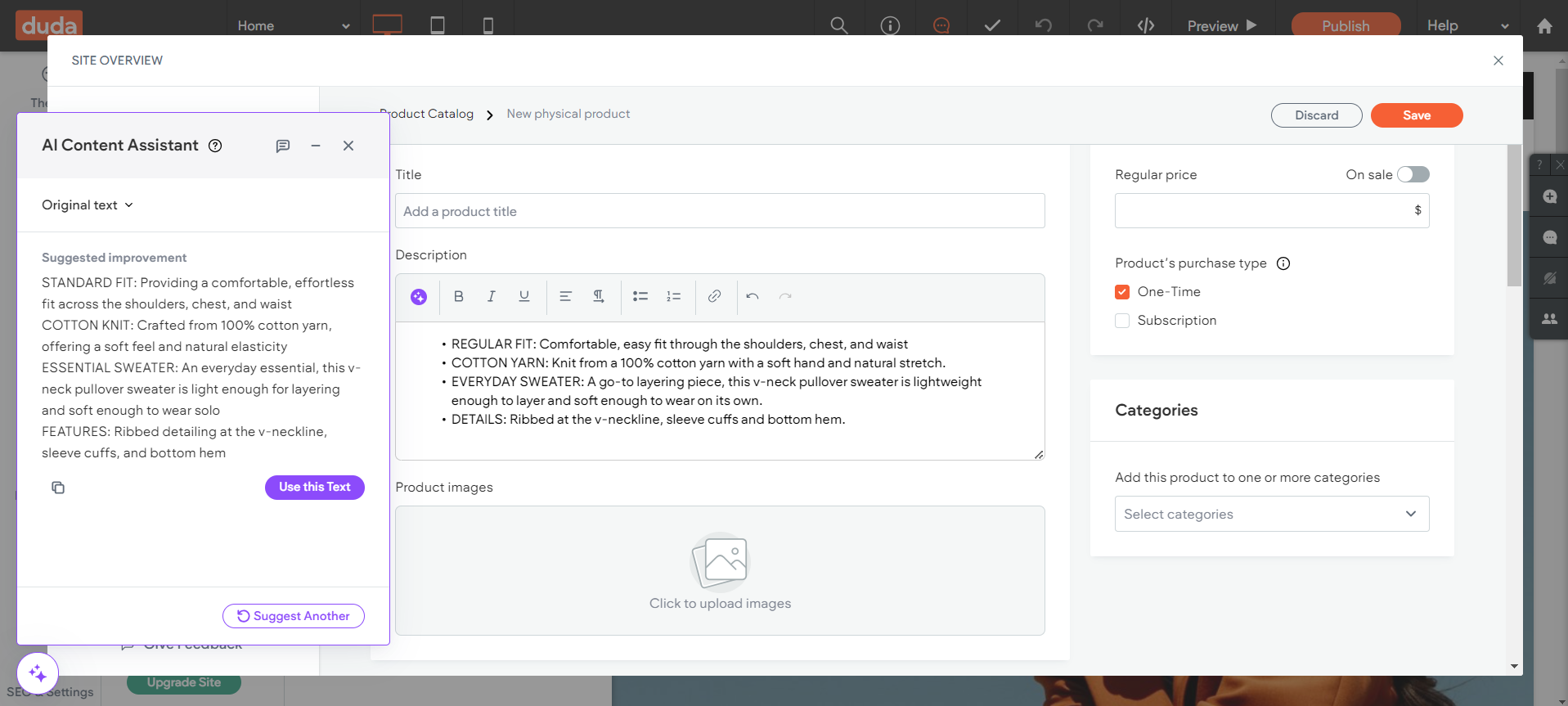
User Management
User ManagementAssesses the platforms’ capabilities in managing user roles, permissions, and accessibility.Score Components:
- Role Customization (40%): Flexibility in creating and defining user roles and
permissions. - Ease of Management (30%): User interface and tools for managing users.
- Access Control (20%): Effectiveness of access control measures for different user
levels. - Scalability (10%): Ability to manage a growing number of users efficiently.
 8.8
8.8
 8.0
8.0
🏆 Winner: Elementor
. Both Elementor and Duda offer user management features, but they approach it differently.
- Elementor operates on WordPress, so the number of users who can edit or manage a website depends on the roles and permissions set within WordPress. Administrators have full access to edit any part of the site, including Elementor settings, while Editors can manage posts and pages made with Elementor. Authors and Contributors have limited capabilities. Elementor Pro offers a Role Manager feature, enabling further customization of what different roles can do within Elementor.
- Duda allows for collaborative website management, with the number of users and permissions varying by subscription plan. Higher-tier plans enable more users to participate, offering roles like Owner/Administrator, Designer, Content Editor, and Developer, each with distinct access levels. Some plans also allow for the creation of custom roles, providing flexibility in team management.
Elementor User Roles and Access Levels:
| Role | Description | Access Highlights |
|---|---|---|
| Administrator | Users with full access to all administration features, including Elementor settings. | Can edit all content, Access to Elementor settings, Can install plugins and themes, Can manage users |
| Editor | Users who can manage and publish content including pages and posts. | Can edit pages/posts created with Elementor, Cannot access Elementor settings, Can manage categories, tags, and links, Can moderate comments |
| Author | Users who can publish and manage their own posts. | Can create posts with Elementor, Cannot edit pages, Limited access to media library, Cannot access Elementor settings |
| Contributor | Users who can write and manage their own posts but cannot publish them. | Can create content with Elementor, Cannot publish or edit pages, No access to Elementor settings, Submissions require review by higher-level roles |
Additional Features

|

|
|
|---|---|---|
|
SSL Certificate |
|
|
|
Custom Domain |
|
|
|
Free Custom Domain Included |
|
|
|
International Domains |
|
|
|
Mobile Responsive |
|
|
|
Page Speed |
|
|
|
Website Builder Mobile App |
|
|
|
Convert a Website To An App |
|
|
|
Website Analytics |
|
|
|
Multilingual Sites |
|
|
|
Multiple Users |
|
|
User Feedback
Elementor is widely appreciated for its intuitive drag-and-drop interface, enabling rapid creation of professional and responsive websites without coding skills. It offers a vast range of templates and compatibility with WordPress, making it a go-to for diverse users. Despite its benefits, concerns arise regarding website loading times, subscription costs, and occasional compatibility issues. Feedback on customer support and legacy plan management is mixed, with some users experiencing dissatisfaction. Overall, Elementor is valued for its efficiency in web development, although some aspects, particularly support services, could be improved.
Duda garners positive reviews for its user-friendly interface, extensive customization options, and responsive customer support. Users appreciate its drag-and-drop features, diverse integrations, and ability to cater to both novices and experienced developers. However, some note complexities with certain features like Duda Flex and occasional inconsistencies in design. Despite this, Duda remains a valuable tool for quick and efficient website development and management, offering a balance of ease-of-use and customization.
The making of this blog
We followed a clear, step-by-step process to write and research this article.
FAQ
Which is better for ecommerce, Elementor or Duda?
Can I use Elementor and Duda for creating informational and business websites?
How do Elementor and Duda compare in terms of ease of use?
Which platform offers better hosting quality?
Are Elementor and Duda good choices for optimizing website speed?
Which platform has better customer support?
How do Elementor and Duda handle security?
Which platform is better for AI capabilities?
Can I manage multiple users with Elementor and Duda?










